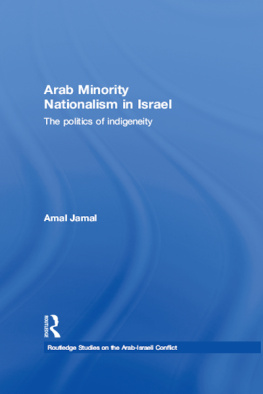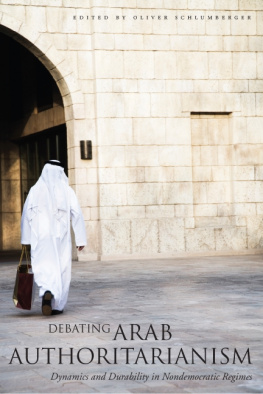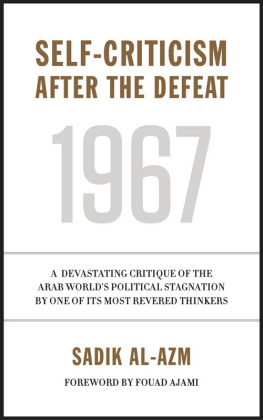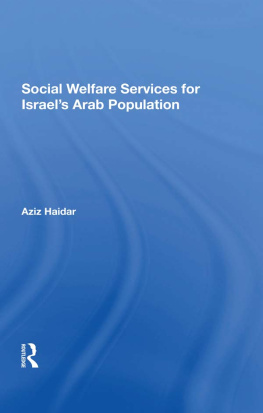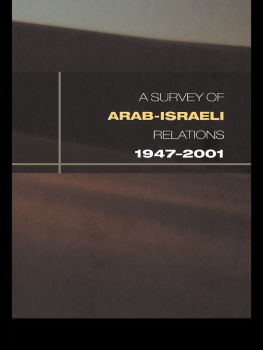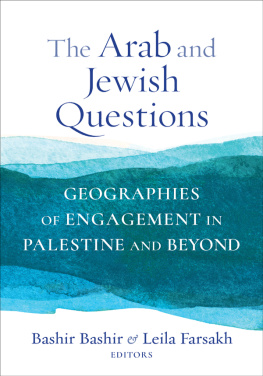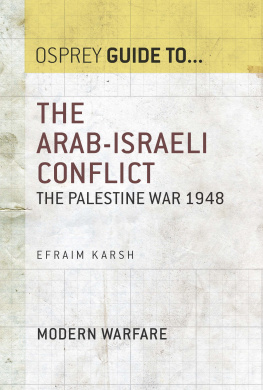ROUTLEDGE LIBRARY EDITIONS:
ISRAEL AND PALESTINE
Volume 8
PALESTINE IN THE ARAB DILEMMA Palestine in the Arab Dilema Walid W. Kazziha
First published in 1979 This edition first published in 2015
by Routledge
2 Park Square, Milton Park, Abingdon, Oxon, OX14 4RN and by Routledge
711 Third Avenue, New York, NY 10017 Routledge is an imprint of the Taylor & Francis Group, an informa business 1979 Walid W. Kazziha All rights reserved. No part of this book may be reprinted or reproduced or utilised in any form or by any electronic, mechanical, or other means, now known or hereafter invented, including photocopying and recording, or in any information storage or retrieval system, without permission in writing from the publishers. Trademark notice : Product or corporate names may be trademarks or registered trademarks, and are used only for identification and explanation without intent to infringe. British Library Cataloguing in Publication Data
A catalogue record for this book is available from the British Library ISBN: 978-1-138-89267-5 (Set)
eISBN: 978-1-315-69513-6 (Set)
ISBN: 978-1-138-90420-0 (Volume 8)
eISBN: 978-1-315-69647-8 (Volume 8) Publishers Note
The publisher has gone to great lengths to ensure the quality of this reprint but points out that some imperfections in the original copies may be apparent. Disclaimer
The publisher has made every effort to trace copyright holders and would welcome correspondence from those they have been unable to trace. PALESTINE IN
THE ARAB DILEMMA WALID W. KAZZIHA
CROOM HELM LONDON BARNES & NOBLE BOOKS NEW YORK
(a division of Harper & Row Publishers, Inc.) 1979 Walid W. Kazziha
Croom Helm Ltd, 2-10 St John's Road, London SW11 British Library Cataloguing in Publication Data Kazziha, Walid W
Palestine in the Arab dilemma.
1. Fedayeen 2. Arab countries Foreign relations
I. Title
332.4'2'095694 DS119.7
ISBN 0-85664-864-7 Published in the USA 1979 by
HARPER & ROW PUBLISHERS, INC.
BARNES & NOBLE IMPORT DIVISION Library of Congress Cataloging in Publication Data Kazziha, Walid.
Palestine in the Arab dilemma.
Includes bibliographical references and index.
1. Palestinian Arabs Politics and government
Addresses, essays, lectures. 2. Arab countries Politics and government 1945 Addresses, essays, lectures. 3. Jewish-Arab relations Addresses, essays, lectures. I. Title.
DS119.7.K37 320.9'17'4927 78-10543
ISBN 0-06-494004-7 This book is part of a series of works which the Istituto Affari Internazionali is publishing within the framework of a research programme financed by the Ford Foundation dedicated to the problems of the Mediterranean. Printed in Great Britain by
Billing & Sons Limited, Guildford, London and Worcester Contents | Stefano Silvestri | The Political and Ideological Impact of the Palestinian
Resistance Movement on the Arab World Since 1967 | The Lebanese Civil War and the Palestinian Resistance
Movement |
The Arab-Israeli war like all wars is a great 'simplifier'. It creates the simplistic impression that there are two opposing fronts, each one united and firmly single minded in its hostility towards the other, with well defined objectives and a clear-cut conception of what it wants from victory. Of course, this is not the case. Not only are there large and ever growing political differences inside Israel, but the difficulties on the Arab side are just as plentiful and as serious. The war is breaking up into a series of micro-conflicts, both within the two camps and between the Arabs and Israelis. A better grasp of these conflicts is the key to an attempt at understanding the war itself and, perhaps, to putting an end to it. The most notorious of these micro-conflicts and at the same time the one most frequently ignored is between the Arabs and the Palestinians. This has been through some very 'hot' phases, ranging from the Black September in Jordan to the Lebanese civil war; from the creation of the 'Rejection' Front to the various terrorist actions by the Palestinian organisations (which, while certainly aimed at hitting Israel and her real or supposed allies, were also intended to support one or other of the factions in the Arab-Palestinian conflict). There is a complex scenario to this conflict, with component parts of varying importance, such as: the development of the Arab-Israeli war; the internal policies of the various Arab countries and regimes; the international policy and military alliances of the Arab states; and the internal policies of, and the reciprocal relations between, the various Palestinian organisations. There is no history of this conflict, nor any clear methodological definition of the protagonists and the relationships between them. On the contrary, its very existence is sometimes denied and there is condemnation only of the 'betrayal' by one or other of the Arab political leaders of the cause of Arab-Palestinian unity. For instance, this is the main accusation levelled by the 'Rejection' Front against Sadat at present. However, there is more to it than this. This book is written by a Lebanese intellectual of Syrian extraction, who was in his day involved in militant organisations and now lectures at the American University in Cairo. In a previous book (Revolutionary Transformation in the Arab World; Habash and His Comrades from Nationalism to Marxism, Charles Knight, London 1974), he tried to provide a critical history of the birth of the Palestinian liberation movement, and at the same time, of the political development of the revolutionary pan-Arab movement. The problems as put by Kazziha are fairly classic in their way: What is the correct objective for the Palestinians? Where do their real interests lie? How do these coincide with those of the various Arab states? He draws a clear-cut conclusion: there is in fact a clash of interests. The pan-Arab movement and the Palestinians are mutually contradictory, and there is an even greater discrepancy between the Palestinian position and the Arab regimes. Lastly, there is a contradiction between present Arab policy and the revolutionary movement. The Palestinians, in his view, are used in turn as puppets, cannon fodder and barter goods; as the casus belli or the casus foederis : as a pretext for imperialist adventures or aspirations to hegemony; and as a scapegoat for all manner of policies with which they have nothing to do. All their actions are turned to the advantage of one side or the other. Even when they ostensibly win greater bargaining power (as at the Arab summit meeting at Rabat when they were officially recognised as representing Palestinian interests), the Palestinian organisations have to be prepared for new disasters and be prepared to provide the justification for fresh 'betrayals'. The fact is (Kazziha seems to suggest) that it is not so much a matter of 'betrayal' as of a logical attempt by the stronger regimes to suppress what they see as a 'disruptive' element, an undisciplined variable in their calculations, a drifting mine afloat in situations which should be consolidated and brought under a tight and centralised control. | Next page

